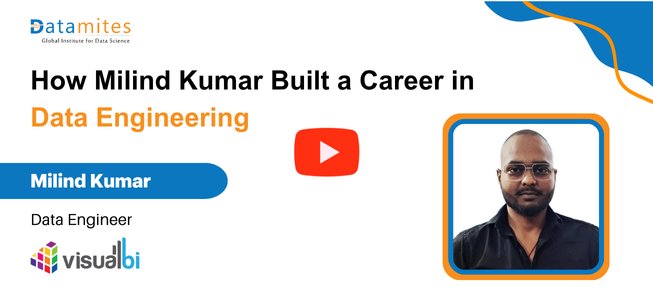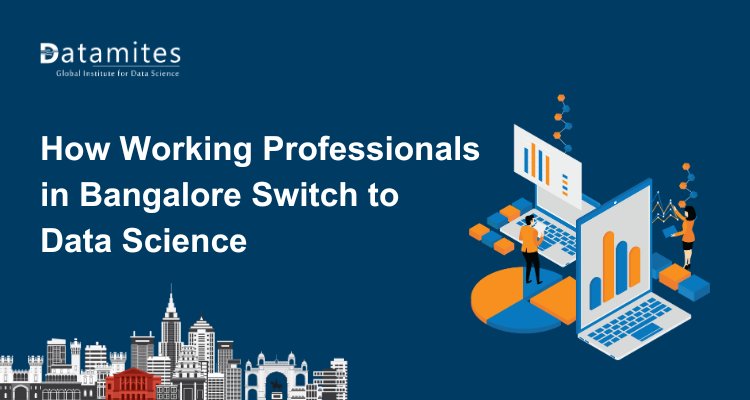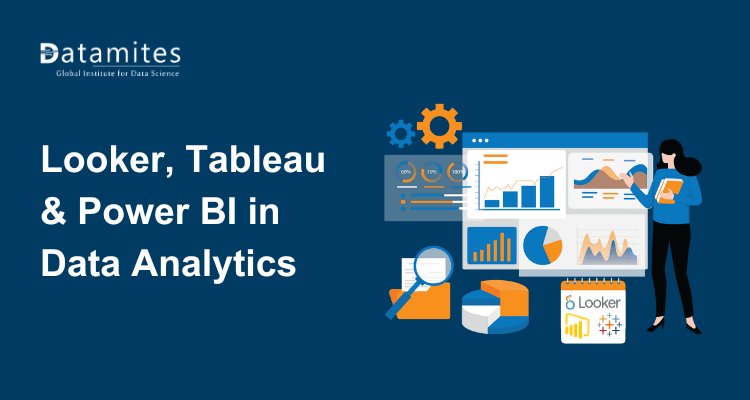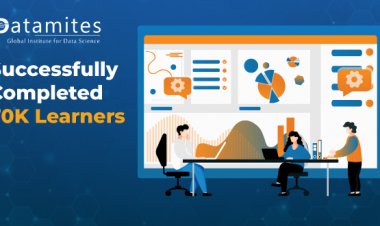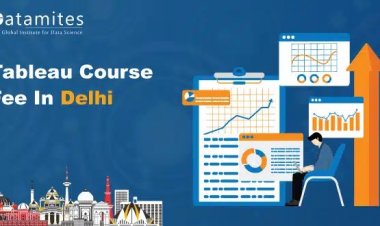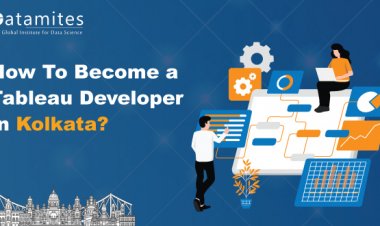How Milind Kumar Built a Career in Data Engineering
Milind Kumar built a strong career in data engineering by mastering data systems, leading complex projects, and creating scalable pipelines that turned raw data into insights driving business growth and innovation.
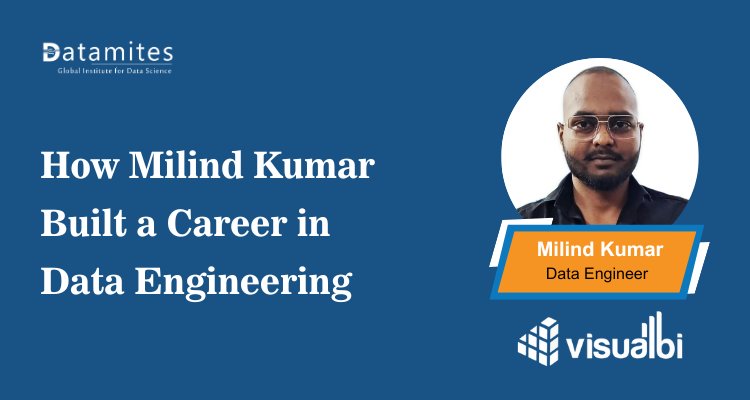
Breaking into data engineering without a coding background might sound impossible, but Milind Kumar proved it can be done with the right approach. Coming from a civil engineering background, Milind transformed his career through structured learning, consistent practice, and a deep interest in data. His journey from a non-IT graduate to a Data Engineer at a top firm highlights how determination and the right training can turn ambition into reality.
Milind’s success story is one of many from learners who started their data journey with DataMites. The institute’s practical, industry-aligned training programs have helped thousands of professionals build real-world skills and launch successful tech careers. If you’re looking for inspiration, you can watch DataMites success stories alumni who’ve transitioned into data science, analytics, and engineering roles across the globe.
How Milind Kumar Built a Successful Career in Data Engineering with DataMites
Explore how Milind transitioned from a civil engineering background to a growing career in data engineering through structured learning, hands-on projects, and real-world experience.
1. Can you tell us a bit about your background and where you currently work?
I completed my graduation in civil engineering in 2020. Today, I work as a Data Engineer at Visual BI Solutions, located in Bengaluru. Before this, I worked with UserReady Technologies for around 15–16 months.
2. How did you start your career in data science and analytics?
After graduation, I had no background in coding. I explored multiple options but wanted something practical and affordable. That’s when I discovered data science and joined the DataMites program in September 2021. The course gave me a foundation in Python, SQL, and machine learning, which opened the doors to IT.
3. What motivated you to choose data science over other options like an MBA?
Mainly practicality and cost. I needed to start earning quickly, and data science seemed like a fast-growing, opportunity-rich field. I wanted something that could help me build a long-term career in technology.
4. How was your experience learning data science as a non-coder?
Honestly, it was smoother than I expected. The DataMites training simplified coding concepts and made Python easy to understand. My trainer, Deepa, played a big role in helping me build a solid base. With practice, everything started to click.
5. What tools and technologies do you use daily as a data engineer?
Most of my work revolves around SQL and data warehousing tools. I primarily use Snowflake, along with PostgreSQL, MS SQL Server, and ETL tools like Alteryx, Matillion, and DBT. I’ve also had exposure to SAP HANA views, ADF (Azure Data Factory), and SAP BW.
6. Why do you prefer working with Snowflake?
Snowflake has become popular because it separates storage and compute, making it faster and more flexible than traditional systems. I’m also SnowPro Core Certified, which helped me specialize as a Snowflake Developer before transitioning into a broader Data Engineering role.
7. What kind of training did you receive before starting your first job?
Most of my training came from DataMites. The program built my foundation in data handling, SQL, and Python. That knowledge helped me quickly pick up tools like PostgreSQL and MS SQL Server once I started working.
8. How many interviews did you attend before landing your first job?
I attended around 11–12 interviews over a month and a half. I eventually got my first role at UserReady Technologies as an Associate Data Engineer.
9. What were the typical interview rounds like for a data engineer?
Usually, there were three rounds:
- Python technical round
- SQL assessment (often with live coding)
- HR interview
One of the toughest interviews I had was with Uber, where I was asked to perform hands-on SQL coding during the call.
10. Can you share the type of coding questions asked in data interviews?
A common one is: “Find the third highest salary from a list of employees.” You’ll also get questions on joins, window functions, aggregations, and data transformations. Practicing SQL coding challenges online really helps.
11. What advice would you give to freshers preparing for data interviews?
Understand the concepts behind every question instead of just memorizing answers. Practice SQL daily, revise Python basics, and review all materials provided by your training program. Consistency is key.
12. How close was your internship experience to a real-world job?
My internship with DataMites and Rubixe Consulting helped me understand how data behaves in real-world scenarios. We worked on projects like the FIFA 20 dataset, applying clustering and predictive models. It was a great learning experience, not just theory.
13. How did you overcome the initial challenge of learning programming?
I started small just one concept a day. Python was my first language, and I focused on understanding logic, not just syntax. The course projects and assignments helped me gain confidence.
14. What are your future plans in data engineering?
I want to go deeper into SAP and become a SAP consultant, because it’s a tool with wide industry adoption. I also plan to learn Big Data technologies like Azure Synapse, Azure Fabric, and Hadoop as my next step.
15. What advice do you have for non-coders who want to start in data science?
Don’t get intimidated by coding. Start with a structured course like DataMites that teaches Python and SQL from scratch. Focus on the logic behind problems, practice regularly, and stay patient. Within months, you’ll start thinking like a programmer.
16. Is coding necessary for data analysts too?
Yes, at least SQL and a bit of Python. Data analysts work with past trends, so SQL is essential for querying and data manipulation. Data science tools like Tableau and Power BI are also critical for visualization.
17. How important is hands-on practice in data science?
Extremely important. You can’t just read about Python or SQL you need to write and test your own code. The more you experiment with datasets and mini-projects, the faster you’ll grow.
18. What’s your message for students who are struggling to get their first break?
Keep learning and stay persistent. I failed several exams before finding my path. Every rejection teaches you something. Focus on learning, building projects, and networking. The right opportunity will come.
Refer to these articles:
- Navdeep Raj’s Journey to Building a Career in Data Engineering
- Exploring the Evolution of Data Engineering with Nikhil Verma
- Yasaswini’s Inspiring Transition into Data Engineering
Milind’s Journey to Data Engineering: Key Insights
Milind’s story shows how focus, practical training, and steady learning can help someone from a non-coding background build a strong career in data engineering, driven by curiosity and consistent skill development.
- Milind transitioned from a civil engineering background to data engineering.
- He trained at DataMites, learning Python, SQL, and machine learning from scratch.
- Landed his first job after 11–12 interviews at UserReady Technologies.
- Currently works as a Data Engineer at Visual BI Solutions, Bengaluru.
- Uses tools like Snowflake, SQL Server, PostgreSQL, Alteryx, Matillion, DBT, and SAP HANA.
- Holds SnowPro Core Certification in Snowflake.
- Interview rounds typically tested Python, SQL, and logical problem-solving.
- Practiced coding daily and focused on understanding logic, not memorization.
- Internship projects offered hands-on experience with real datasets.
- Plans to grow into SAP consulting and explore Big Data tools (Azure Synapse, Fabric, Hadoop).
- Recommends consistent practice, patience, and concept-based learning for beginners.
- Stresses that even data analysts need SQL, Python, and data visualization tools.
- Believes persistence and continuous learning are key to career success.
- Proves that non-coders can successfully build careers in data science and analytics.
Refer to these articles:
- Why Bangalore Is India’s Fastest-Growing Startup Hub
- Why Hyderabad is India’s Quiet Tech Capital
- Why Pune is the Next Big Startup Hub in India
Milind’s story is proof that a non-coding background doesn’t limit your career in data. With structured learning, consistent practice, and curiosity, anyone can transition into data science, analytics, or data engineering.
For aspiring professionals, the takeaway is simple: start small, stay consistent, and keep learning. The data industry rewards those who build strong foundations and keep evolving with new technologies.
For anyone aiming to grow in data science or data engineering, Milind Kumar’s story is a great example of how persistence and structured learning can change a career path. According to Mordor Intelligence, the global data science platform market is projected to grow from USD 111.23 billion in 2025 to USD 275.67 billion by 2030, at a CAGR of 21.43% a clear sign of the rising demand for skilled data professionals across industries.
Milind, a civil engineering graduate, built his Data Engineering career through practical learning at DataMites. The program gave him hands-on experience in Python, SQL, Snowflake, ETL tools, and data warehousing, along with real-world training in managing and optimizing data pipelines. With expert mentorship and project-based learning, he gained the confidence to handle large datasets and transition smoothly into IT. If you’re aiming for a similar shift, a Data Engineer course can help you build the technical and project skills to succeed.
DataMites backed by globally recognized certifications like IABAC and NASSCOM FutureSkills, DataMites prepares learners with the technical skills, project experience, and placement support needed to build careers in data analytics, data engineering, and AI. Enrolling in a data science course in India in cities like Bangalore, Pune, Hyderabad, Chennai, Mumbai, or Delhi can open doors to high-demand roles across the IT and analytics landscape.
Whether you’re a fresher, a working professional, or someone looking to upskill like Milind, DataMites makes quality data science and data engineering education accessible to everyone. With a mix of online and classroom training, DataMites offers data science courses in Bangalore, Mumbai, Hyderabad, Pune, Chennai, Ahmedabad, Coimbatore, and Delhi, along with flexible remote learning options for those who prefer to study from anywhere in India.
Milind’s journey shows that with the right guidance, hands-on practice, and steady commitment, building a successful career in data engineering isn’t just within reach it’s a smart move toward long-term professional growth in a rapidly expanding industry.
